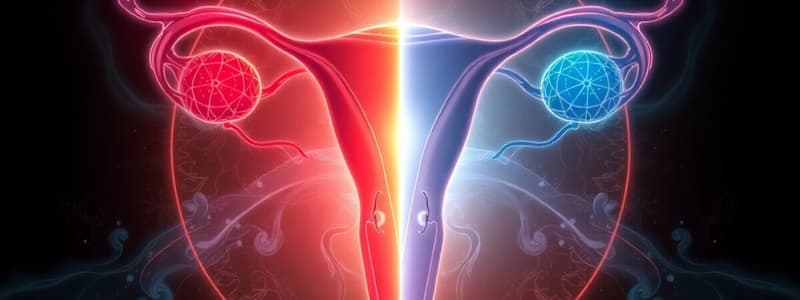Podcast
Questions and Answers
What hormone is responsible for stimulating the release of an egg during the ovulation phase?
What hormone is responsible for stimulating the release of an egg during the ovulation phase?
During which phase of the menstrual cycle does the egg remain viable for fertilization?
During which phase of the menstrual cycle does the egg remain viable for fertilization?
What happens to the hormone that maintains the endometrium at the end of the menstrual cycle?
What happens to the hormone that maintains the endometrium at the end of the menstrual cycle?
Which days are considered the most fertile in a typical 28-day menstrual cycle?
Which days are considered the most fertile in a typical 28-day menstrual cycle?
Signup and view all the answers
What is the primary function of estrogen in the menstrual cycle?
What is the primary function of estrogen in the menstrual cycle?
Signup and view all the answers
What structure connects the cervix to the outside of the body?
What structure connects the cervix to the outside of the body?
Signup and view all the answers
If the egg is not fertilized, what is the fate of the egg cell?
If the egg is not fertilized, what is the fate of the egg cell?
Signup and view all the answers
Why is the Calendar Rhythm Method not suitable for women with irregular cycles?
Why is the Calendar Rhythm Method not suitable for women with irregular cycles?
Signup and view all the answers
Study Notes
Ovulation Phase (Day 14)
- The pituitary gland secretes a hormone that triggers the release of a matured egg cell from the ovary.
- The released egg enters the fallopian tube, aided by the cilia of the fimbriae, which are finger-like projections at the tube's end.
- Cilia are slender hair-like structures that help transport the egg towards the uterus.
Luteal Phase (Day 15-28)
- Begins on the 15th day and lasts until the cycle ends.
- The egg remains in the fallopian tube for approximately 24 hours post-ovulation.
- If not fertilized, the egg disintegrates after 24 hours.
- The hormone responsible for maintaining the uterine lining depletes by the cycle's end, initiating the menstrual phase of the next cycle.
Menstrual Cycle and Hormones
- Day 1-5: Menstruation occurs if fertilization does not happen; blood loss ranges from 10ml to 80ml.
- Day 1-13: Follicle-stimulating hormone (FSH) promotes egg maturation in the ovary.
- Day 14: Luteinizing hormone (LH) activates egg release.
- Day 15-28: Progesterone maintains the uterine lining in preparation for fertilization.
Menstrual Calendar
- Used for natural birth control known as the Calendar Rhythm Method.
- Ineffective for women with irregular cycles or those lasting less than 25 or more than 32 days.
- Average ovulation typically occurs on day 14; fertile days span from day 11 to day 16.
- Sperm can survive inside the female body for 3-4 days, while the egg ceases to be viable after 3 days post-ovulation.
Vagina
- A muscular tube connecting the cervix to the external body.
- Functions as the passage for penis entry during intercourse and the birth canal during childbirth.
- Serves as the exit route for menstrual blood.
Estrogen
- A female sex hormone produced in the ovaries.
- Responsible for the onset of puberty and regulation of the menstrual cycle.
- Inhibits FSH production to prevent multiple egg releases per cycle.
- Stimulates repair and thickening of the uterine lining and triggers LH release from the pituitary gland.
Menstrual Phase (Day 1-5)
- Commences on the first day of menstruation, lasting until day 5.
- The internal lining of the uterus is shed, resulting in menstrual fluid expulsion.
- Abdominal cramps may occur due to uterine and abdominal muscle contractions to eliminate menstrual fluid.
Studying That Suits You
Use AI to generate personalized quizzes and flashcards to suit your learning preferences.
Description
This quiz covers essential concepts related to the ovulation and luteal phases of the menstrual cycle. It explores the role of hormones, the pituitary gland, and anatomical structures involved in these phases. Test your knowledge of the biological processes occurring on day 14 and beyond.




